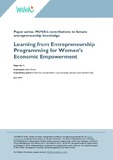| dc.contributor.author | Thorpe, Jodie | |
| dc.contributor.author | Ault, Alisha | |
| dc.contributor.author | Barenboim, Iana | |
| dc.contributor.author | Guimarães, Luize | |
| dc.contributor.author | Quak, Evert-jan | |
| dc.contributor.author | Taela, Katia | |
| dc.date.accessioned | 2023-06-15T11:48:12Z | |
| dc.date.available | 2023-06-15T11:48:12Z | |
| dc.date.issued | 2023-01-14 | |
| dc.identifier.citation | Thorpe, J.; Ault, A.; Barenboim, I.; Guimarães, L.; Quak, E-J. and Taela, K (2023) Learning from Entrepreneurship Programming for Women’s Economic Empowerment, MUVA Paper Series, Brighton: Institute of Development Studies, DOI: 10.19088/MUVA.2023.001 | en |
| dc.identifier.uri | https://opendocs.ids.ac.uk/opendocs/handle/20.500.12413/18019 | |
| dc.description.abstract | MUVA is a social incubator dedicated to developing innovative approaches to the economic empowerment of women in Mozambique. This paper documents experiences from two MUVA projects supporting women’s economic empowerment through entrepreneurship, and draws out broader insights and principles of relevance to other similar programmes. Barriers to women’s economic empowerment and strategies to overcome these barriers are both individual and systemic, visible and invisible.
MUVA’s approach to supporting women’s economic empowerment through entrepreneurship involves tailoring three core elements to the specific context of different profiles of women business owners, including urban informal vegetable and fruit traders (MUVA+) and owners of small businesses with untapped growth potential (PAM). Both are groups of low-income female entrepreneurs that are rarely eligible for acceleration and entrepreneurship support. Core programme elements are technical skills, personal development and opportunity generation.
However, the project results show that no particular intervention generates impact. Rather, what generates impact is how interventions are tailored to entrepreneurs’ specific business needs, responding to both the external context and internal constraints each group faces, through adapting methodologies that are more often used by formal businesses and policymakers. To achieve this, MUVA bundled interventions in ways that address both visible and invisible barriers and opportunities. | en |
| dc.language.iso | en | en |
| dc.publisher | Institute of Development Studies | en |
| dc.relation.ispartofseries | MUVA Paper Series;3 | |
| dc.rights.uri | https://creativecommons.org/licenses/by/3.0/igo/ | en |
| dc.title | Learning from Entrepreneurship Programming for Women’s Economic Empowerment | en |
| dc.type | Series paper (non-IDS) | en |
| dc.rights.holder | © Crown copyright 2023 | en |
| dc.identifier.doi | 10.19088/MUVA.2023.001 | |
| rioxxterms.funder | Default funder | en |
| rioxxterms.identifier.project | MUVA | en |
| rioxxterms.version | VoR | en |
| rioxxterms.versionofrecord | 10.19088/MUVA.2023.001 | en |
| rioxxterms.funder.project | 49af69f8-87cd-4f48-ba06-b6311e105574 | en |


